|
|
|
Sort Order |
|
|
|
Items / Page
|
|
|
|
|
|
|
| Srl | Item |
| 1 |
ID:
186333
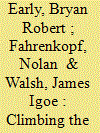

|
|
|
|
|
| Summary/Abstract |
Why do some states possess more advanced military technologies than others? Our study explores the vertical proliferation of land-attack cruise missiles (LACMs), seeking to understand which demand- and supply-side factors best explain why some countries acquire more sophisticated LACMs. We theorize that states’ security environments, regime types, possession of related strategic technologies, and membership in the Missile Technology Control Regime (MTCR) influence the possession of more sophisticated cruise missiles. Our analysis employs a unique new global dataset with granular data on every LACM national militaries have deployed. We use this dataset to evaluate the proliferation of LACMs across the international system from 1991–2015. Using a selection model that first controls for the horizontal proliferation of LACMs, we find that insecurity, scientific and technical expertise from related technologies, the possession of highly authoritarian and highly democratic regimes, and MTCR membership all have positive effects on the sophistication of LACM-possessors’ arsenals.
|
|
|
|
|
|
|
|
|
|
|
|
|
|
|
|
| 2 |
ID:
120332
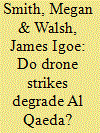

|
|
|
|
|
| Publication |
2013.
|
| Summary/Abstract |
The United States has used unmanned, aerial vehicles-drones-to launch attacks on militants associated with Al Qaeda and other violent groups based in Pakistan. The goal is to degrade the target's capacity to undertake political and violent action. We assess the effectiveness of drone strikes in achieving this goal, measuring degradation as the capacity of Al Qaeda to generate and disseminate propaganda. Propaganda is a key output of many terrorist organizations and a long-standing priority for Al Qaeda. Unlike other potential measures of terrorist group activity and capacity, propaganda output can be observed and measured. If drone strikes have degraded Al Qaeda, their occurrence should be correlated with a reduction in the organization's propaganda output. The analysis presented here finds little evidence that this is the case. Drone strikes have not impaired Al Qaeda's ability to generate propaganda.
|
|
|
|
|
|
|
|
|
|
|
|
|
|
|
|
| 3 |
ID:
079934


|
|
|
|
|
| Publication |
2007.
|
| Summary/Abstract |
The study of international conflict and cooperation has long drawn on game theory for insights. Recent developments have made the assumptions of game theory more realistic. Particularly important is the development of signaling games, which analyze situations when decision-makers lack complete information about their environment. Signaling game logic has been applied to many areas of international politics in the past decade, including decisions to go to war, crisis bargaining, international economic negotiations, regional integration, and the foreign policies of democratic states. The signaling games approach assumes that states are unitary actors with a single preference ordering and set of beliefs. I relax this assumption by developing an informal model in which decision-makers can hold different prior beliefs and preferences, and investigate this model's usefulness by analyzing how the United States responded to the more cooperative foreign policy signals initiated by the Soviet Union under Gorbachev. This step further deepens the realism of game-theoretic applications to foreign policy by explaining how political conflict among domestic actors influences foreign policy choices
|
|
|
|
|
|
|
|
|
|
|
|
|
|
|
|
| 4 |
ID:
186860
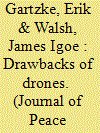

|
|
|
|
|
| Summary/Abstract |
Growing reliance on Unmanned Aerial Vehicles (UAVs) in the effort to combat militant groups has led to considerable debate about the consequences of this new mode of warfare. While critics have focused on the impact of civilian casualties on militant recruitment and the resulting use of terrorism, evidence suggests that ‘drones’ are paradoxically more effective in limiting civilian deaths compared to other forms of military force. This article demonstrates a different causal pathway connecting militant use of force to terrorist attacks. Drone strikes encourage militants to displace operations to urban centers. Confronted with unfamiliar terrain and greater government capacity, militants emphasize terrorist attacks against civilians. The article explores these dynamics in the longest running drone campaign, in Pakistan. While civilian casualties from drone strikes have no discernible effect on terrorism, strikes that kill militants increase terrorist attacks against civilians in urban settings, while failing to reduce attacks on government targets.
|
|
|
|
|
|
|
|
|
|
|
|
|
|
|
|
| 5 |
ID:
161557


|
|
|
|
|
| Summary/Abstract |
We introduce a new dataset measuring if and how rebel groups earn income from the exploitation of natural resources or criminal activities. The Rebel Contraband Dataset makes three contributions to data in this area. First, it covers a wide range of natural resources and types of crime. Second, it measures rebel engagement in these activities over time. Third, it distinguishes among different strategies that rebel groups employ, such as extortion and smuggling. Theory suggests that reliance on natural resource wealth should lead rebels to mistreat civilians, but cross-group research using existing data does not find support for this relationship. We replicate an earlier study using data from the Rebel Contraband Dataset and conclude that there is a consistent relationship between natural resource exploitation and civilian victimization. Future research can use the dataset to explore questions about the onset, location, severity, and outcomes of civil conflicts.
|
|
|
|
|
|
|
|
|
|
|
|
|
|
|
|
| 6 |
ID:
084238


|
|
|
| 7 |
ID:
098171
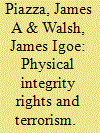

|
|
|
| 8 |
ID:
158006


|
|
|
|
|
| Summary/Abstract |
Targeted killings have become a central tactic in the United States' campaigns against militant and terrorist groups in the Middle East, Asia, and Africa. Both ‘demand’ and ‘supply’ factors explain the rise of targeted killings. Demand for targeted killings increased as the United States faced new threats from militant groups that could not be effectively countered with conventional military force. Concerns about the political consequences of long-term military involvement overseas and American casualties led political leaders to supply more targeted killings. The conclusion discusses how this tactic may have unintended consequences as other states follow the United States use of targeted killings.
|
|
|
|
|
|
|
|
|
|
|
|
|
|
|
|
| 9 |
ID:
087577


|
|
|
|
|
| Publication |
2009.
|
| Summary/Abstract |
Do terrorist attacks by transnational groups lead governments to restrict human rights? Conventional wisdom holds that governments restrict rights to forestall additional attacks, to more effectively pursue suspected terrorists, and as an excuse to suppress their political opponents. But the logic connecting terrorist attacks to subsequent repression and the empirical research that addresses this issue suffer from important flaws. We analyze pooled data on the human rights behavior of governments from 1981 to 2003. Our key independent variable of interest is transnational terrorist attacks, and the analysis also controls for factors that existing studies have found influence respect for human rights. Repeated terrorist attacks lead governments to engage in more extrajudicial killings and disappearances, but have no discernable influence on government use of torture and of political imprisonment or on empowerment rights such as freedom of speech, assembly, and religion. This finding has important implications for how we think about the effects of terrorism and the policy responses of states, non-governmental organizations, and international institutions interested in protecting human rights.
|
|
|
|
|
|
|
|
|
|
|
|
|
|
|
|
| 10 |
ID:
159565
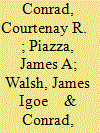

|
|
|
|
|
| Summary/Abstract |
Do governments respond to terrorism with torture? Although governments face incentives to increase torture in response to terrorist attacks, previous research finds no relationship between terror and state torture. We argue that this is unsurprising because incentives to violate human rights differ across domestic government agencies. Using new data that disaggregates state torture by the government agency responsible for the abuse, we investigate the effect of transnational and domestic terrorism on torture perpetrated by military officials. We find that military agents—especially those in democracies—engage in substantively more widespread torture when confronted with terrorism and that this behavior is particularly likely in response to transnational attacks.
|
|
|
|
|
|
|
|
|
|
|
|
|
|
|
|
|
|
|
|
|